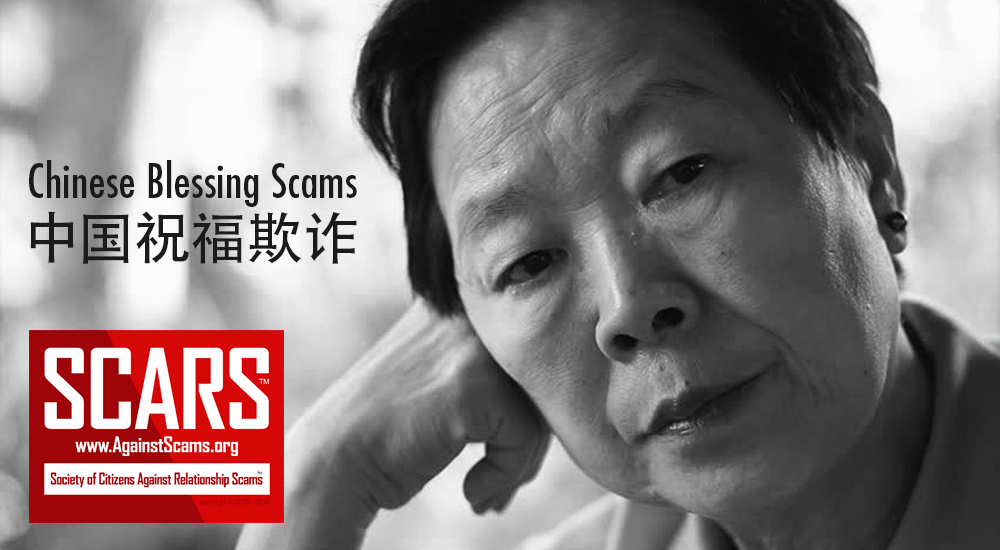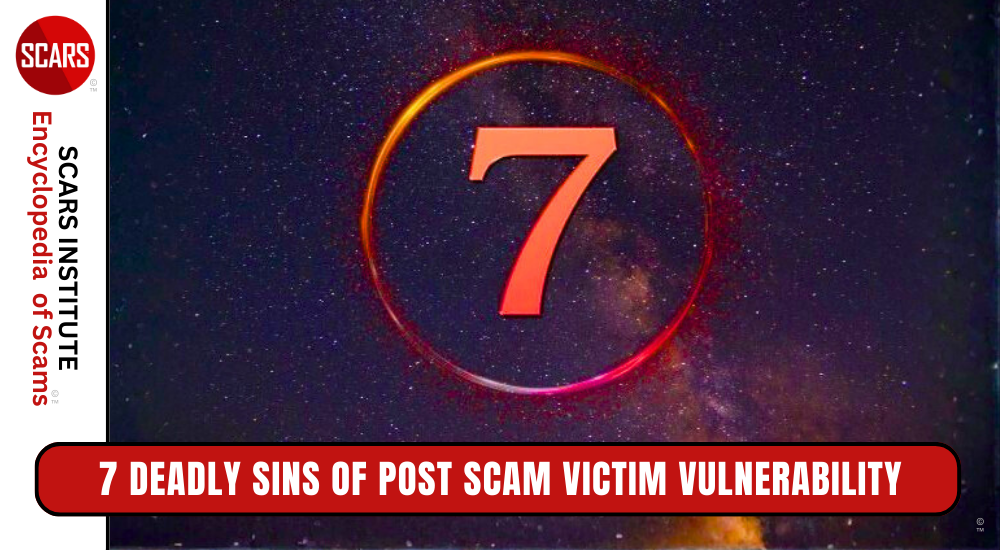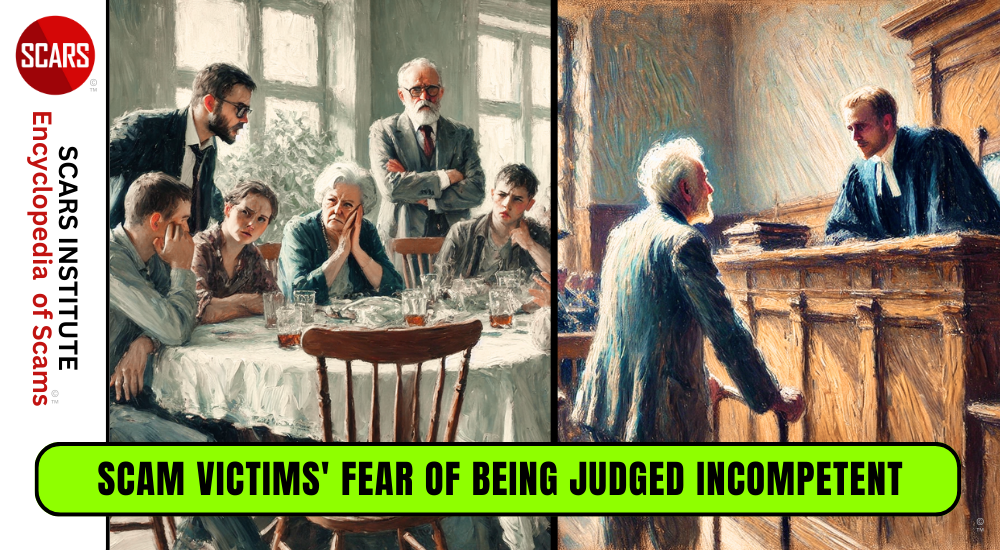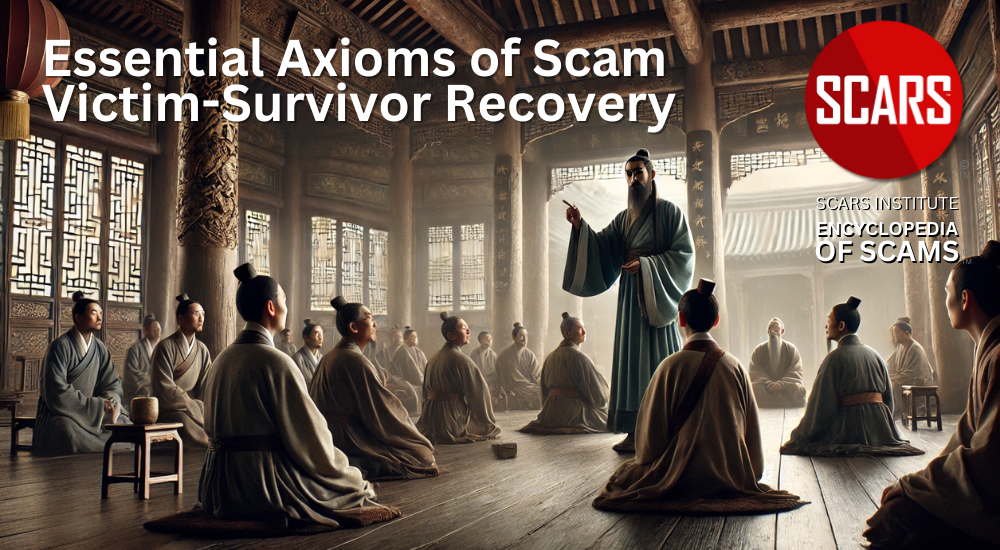
SCARS Institute’s Encyclopedia of Scams™ Published Continuously for 25 Years

Why Keeping Your Scam Secret Harms You And Everyone Else!
The More You Keep It Bottled Up, The More Your Trauma Will Progress
Eventually, it can develop into full Post Traumatic Stress Disorder (PTSD)
Keeping Your Scam Secret Will Only Increase Your Trauma
Why Scam Victims Don’t Disclose Being A Victim
Being a scam victim is often not disclosed to anyone for many years. Some people may never disclose.
When it happens, disclosure is often a process, not a single event.
For example, an individual may first provide hints about a scam; if the response is supportive, then more information is shared. Over time, they may fully disclose the details of the event(s).
Common reasons for not disclosing the scam include not wanting family or other people to know, being unable to explain the incident is part of the problem, fear that police will not take it seriously, or fear of police hostility.
According to many crime victims’ assistance organization, SCARS|ANALYTICS™ and the Department of Justice data, other reasons that scam victims do not disclose include:
- Emotional Pain: Trying to avoid thinking about, remembering, or talking about the romance scam because it is emotionally painful.
- Shame: Romance scam trauma is associated with a high degree of stigma in our society. Most victims are embarrassed for others to know that they experienced a romance scam. Not having been able to protect themselves during the scam makes many victims to feel weak, ashamed, or even that they deserved what happened. They may also fear being “slut-shamed” or criticized for real or alleged relationship behavior.
- Fear Of Not Being Believed: Even though romance scams are a serious crime, it is often mischaracterized as a consensual relationship. Scam victims may fear not being believed about the scam or worry that others will simply condemn them.
- Fear Of Being Blamed: It is common for victims of romance scams to face scrutiny regarding what they did to “cause” the incident, instead of focusing on their lack of consent and manipulation over an extended period of time.
- Fear Of Punishment Or Reprisal: victims may avoid disclosing because they fear familial punishment for rule-breaking (e.g., for meeting people online) after they were warned about the dangers. victims may also fear reprisals from potentially violent perpetrators that threaten them (though these threats are almost universally without real substance), or social ostracism by friends and family.
- Feeling Partly Responsible: When the perpetrator is an unknown face online, victims are more likely to feel responsible for the scam and delay disclosing. Some victims may believe that they did something to contribute to the scam (e.g., if they had not been so needy or lonely, were not so flirting with the scammer during the scam, or used better judgment).
Such confusion and fear may diminish victims’ ability to recognize that the perpetrator is responsible and not them.
Other traumatic reactions: Feeling shocked, dazed, confused, and/or not remembering some details of the event can be traumatic responses to the romance scam. However, victims may fear that no one will believe them if they do not remember all the details, or they may not want to think or talk about the painful event.
More Reasons:
- Limits To Confidentiality: Victims are more aware that if they tell someone the authorities may be notified and become involved if they did anything to help the scammer. This, combined with the above concerns, may keep many scam victims from disclosing a romance scam.
- Fear That Nothing Will Be Done: Data indicate that fewer than 5% of reported incidents of romance scams are ever reported, and much fewer lead to successful prosecutions of the perpetrator. However, the real value of reporting is to alert potential victims.
- Cultural Or Religious Reasons: Cultural or religious beliefs may contribute to a scam victim’s fears about punishment or ostracism. Cultural differences can also influence a victim’s trust in various institutions (such as law enforcement), as well as how a family deals with a crisis.
Benefits of Disclosure
Scam victims who experience a romance scam, its trauma, and its aftermath may have many compelling reasons for not disclosing. The individual holds the final authority over whether to disclose and if so, when, how, and to whom.
For those who do choose to disclose, supports and benefits include:
- Support Services: Reporting to police provides scam victims with the potential for available services that can include financial, counseling, and other access to public assistance.
- Mental Health Services: Romance Scams are associated with potentially serious and long-lasting mental health consequences, including Posttraumatic Stress Disorder (PTSD),
depression, substance use, and other problems, such as adverse effects on work performance or family and peer relationships. - Evidence-Based Treatments Are Available: to help scam victims recover and to prevent these long-term negative effects. SCARS has nearly three-decade of experience with scams and the development of scam victims’ assistance programs.
- Legal Services: Some scam victims and their families wish to pursue remedies within the legal system. Disclosure can be made at any time, but statutes of limitation restrict the time period for which legal options are available. This is particularly true in the event that personal bankruptcy is required due to debt is taken on during the scam.
- Help Your Friends And Family Avoid Scams: Nearly one in five people online are being targeted by scammers right now. The failure to disclose means that critical information is being withheld that could help others remain safe online.
The Simple Truth
The simple truth is that disclosing and sharing the fact that you are a scam victim is both cathartic and liberating. The fear may be significant and difficult to overcome, but once the disclosure is done, then all the imagined fears fade away and you can much more easily deal with reality.
Refusing to tell others has more to do with your own fear than anything anyone else may say or do. It is about your own refusal to accept what happened.
It is all about shame and nothing to do with what people will really think about you.
A large part of that shame was actually planted by the scammer during the romance scam.
One of the subtle manipulations that scammers employ to hold their victims is the use of worthlessness. That is to say, only the scammer loves you, only the scammer values and appreciates you. Only the scammer understands you.
The scammer uses “gaslighting” (a manipulative technique) to isolate you and hold you trapped in the scam, but it also isolates you after the scam as well. By staying trapped and fearful of disclosing the scam, you are allowing the scammers hold over you to continue.
So a large question you have to ask yourself after the same is simply “Do you want to allow the scammer to continue their hold on you?”
How will you respond?
- Will you finally disclose and live in the real world?
- Or will you stay trapped by your scammer living in fear and isolation?
You Will Have To Decide For Yourself!
If you are looking for help, start here: https://www.facebook.com/groups/SCARS.Avoidance.Information.Public.Group/
PLEASE SHARE OUR ARTICLES WITH YOUR FRIENDS & FAMILY
HELP OTHERS STAY SAFE ONLINE – YOUR KNOWLEDGE CAN MAKE THE DIFFERENCE!
THE NEXT VICTIM MIGHT BE YOUR OWN FAMILY MEMBER OR BEST FRIEND!
By the SCARS™ Editorial Team
Society of Citizens Against Relationship Scams Inc.
A Worldwide Crime Victims Assistance & Crime Prevention Nonprofit Organization Headquartered In Miami Florida USA & Monterrey NL Mexico, with Partners In More Than 60 Countries
To Learn More, Volunteer, or Donate Visit: www.AgainstScams.org
Contact Us: Contact@AgainstScams.org
-/ 30 /-
What do you think about this?
Please share your thoughts in a comment below!
Table of Contents
- The More You Keep It Bottled Up, The More Your Trauma Will Progress
- Why Scam Victims Don’t Disclose Being A Victim
- Benefits of Disclosure
- The Simple Truth
- You Will Have To Decide For Yourself!
- PLEASE SHARE OUR ARTICLES WITH YOUR FRIENDS & FAMILY
- By the SCARS™ Editorial Team
Society of Citizens Against Relationship Scams Inc. - The Issue Of Race In Scam Reporting
Click Here To Learn More!
LEAVE A COMMENT?
Recent Comments
On Other Articles
- Arwyn Lautenschlager on Love Bombing And How Romance Scam Victims Are Forced To Feel: “I was love bombed to the point that I would do just about anything for the scammer(s). I was told…” Feb 11, 14:24
- on Dani Daniels (Kira Lee Orsag): Another Scammer’s Favorite: “You provide a valuable service! I wish more people knew about it!” Feb 10, 15:05
- on Danielle Delaunay/Danielle Genevieve – Stolen Identity/Stolen Photos – Impersonation Victim UPDATED 2024: “We highly recommend that you simply turn away form the scam and scammers, and focus on the development of a…” Feb 4, 19:47
- on The Art Of Deception: The Fundamental Principals Of Successful Deceptions – 2024: “I experienced many of the deceptive tactics that romance scammers use. I was told various stories of hardship and why…” Feb 4, 15:27
- on Danielle Delaunay/Danielle Genevieve – Stolen Identity/Stolen Photos – Impersonation Victim UPDATED 2024: “Yes, I’m in that exact situation also. “Danielle” has seriously scammed me for 3 years now. “She” (he) doesn’t know…” Feb 4, 14:58
- on An Essay on Justice and Money Recovery – 2026: “you are so right I accidentally clicked on online justice I signed an agreement for 12k upfront but cd only…” Feb 3, 08:16
- on The SCARS Institute Top 50 Celebrity Impersonation Scams – 2025: “Quora has had visits from scammers pretending to be Keanu Reeves and Paul McCartney in 2025 and 2026.” Jan 27, 17:45
- on Scam Victims Should Limit Their Exposure To Scam News & Scammer Photos: “I used to look at scammers photos all the time; however, I don’t feel the need to do it anymore.…” Jan 26, 23:19
- on After A Scam, No One Can Tell You How You Will React: “This article was very informative, my scams happened 5 years ago; however, l do remember several of those emotions and/or…” Jan 23, 17:17
- on Situational Awareness and How Trauma Makes Scam Victims Less Safe – 2024: “I need to be more observant and I am practicing situational awareness. I’m saving this article to remind me of…” Jan 21, 22:55
ARTICLE META
Important Information for New Scam Victims
- Please visit www.ScamVictimsSupport.org – a SCARS Website for New Scam Victims & Sextortion Victims
- Enroll in FREE SCARS Scam Survivor’s School now at www.SCARSeducation.org
- Please visit www.ScamPsychology.org – to more fully understand the psychological concepts involved in scams and scam victim recovery
If you are looking for local trauma counselors please visit counseling.AgainstScams.org or join SCARS for our counseling/therapy benefit: membership.AgainstScams.org
If you need to speak with someone now, you can dial 988 or find phone numbers for crisis hotlines all around the world here: www.opencounseling.com/suicide-hotlines
A Note About Labeling!
We often use the term ‘scam victim’ in our articles, but this is a convenience to help those searching for information in search engines like Google. It is just a convenience and has no deeper meaning. If you have come through such an experience, YOU are a Survivor! It was not your fault. You are not alone! Axios!
A Question of Trust
At the SCARS Institute, we invite you to do your own research on the topics we speak about and publish, Our team investigates the subject being discussed, especially when it comes to understanding the scam victims-survivors experience. You can do Google searches but in many cases, you will have to wade through scientific papers and studies. However, remember that biases and perspectives matter and influence the outcome. Regardless, we encourage you to explore these topics as thoroughly as you can for your own awareness.
Statement About Victim Blaming
SCARS Institute articles examine different aspects of the scam victim experience, as well as those who may have been secondary victims. This work focuses on understanding victimization through the science of victimology, including common psychological and behavioral responses. The purpose is to help victims and survivors understand why these crimes occurred, reduce shame and self-blame, strengthen recovery programs and victim opportunities, and lower the risk of future victimization.
At times, these discussions may sound uncomfortable, overwhelming, or may be mistaken for blame. They are not. Scam victims are never blamed. Our goal is to explain the mechanisms of deception and the human responses that scammers exploit, and the processes that occur after the scam ends, so victims can better understand what happened to them and why it felt convincing at the time, and what the path looks like going forward.
Articles that address the psychology, neurology, physiology, and other characteristics of scams and the victim experience recognize that all people share cognitive and emotional traits that can be manipulated under the right conditions. These characteristics are not flaws. They are normal human functions that criminals deliberately exploit. Victims typically have little awareness of these mechanisms while a scam is unfolding and a very limited ability to control them. Awareness often comes only after the harm has occurred.
By explaining these processes, these articles help victims make sense of their experiences, understand common post-scam reactions, and identify ways to protect themselves moving forward. This knowledge supports recovery by replacing confusion and self-blame with clarity, context, and self-compassion.
Additional educational material on these topics is available at ScamPsychology.org – ScamsNOW.com and other SCARS Institute websites.
Psychology Disclaimer:
All articles about psychology and the human brain on this website are for information & education only
The information provided in this article is intended for educational and self-help purposes only and should not be construed as a substitute for professional therapy or counseling.
While any self-help techniques outlined herein may be beneficial for scam victims seeking to recover from their experience and move towards recovery, it is important to consult with a qualified mental health professional before initiating any course of action. Each individual’s experience and needs are unique, and what works for one person may not be suitable for another.
Additionally, any approach may not be appropriate for individuals with certain pre-existing mental health conditions or trauma histories. It is advisable to seek guidance from a licensed therapist or counselor who can provide personalized support, guidance, and treatment tailored to your specific needs.
If you are experiencing significant distress or emotional difficulties related to a scam or other traumatic event, please consult your doctor or mental health provider for appropriate care and support.
Also read our SCARS Institute Statement about Professional Care for Scam Victims – click here to go to our ScamsNOW.com website.










![Financial Recovery - Avoid Money Triggers - Perspective on Money for Scam Victims - 2023 [UPDATED 2025] Financial Recovery Money Triggers Financial Recovery - Avoid Money Triggers - Perspective on Money for Scam Victims - 2023 [UPDAYED 2025] - on the SCARS Institute RomanceScamsNOW.com - the Encyclopedia of Scams™](https://romancescamsnow.com/wp-content/uploads/2025/06/Financial-Recovery-Money-Triggers.png)
![Why People Blame Scam Victims? Stop Scam Victim Blaming - [UPDATED 2025] Why People Blame Scam Victims 2025 Why People Blame Scam Victims? Stop Scam Victim Blaming - [UPDATED 2025] - on the SCARS Institute RomanceScamsNOW.com - the Encyclopedia of Scams™](https://romancescamsnow.com/wp-content/uploads/2021/11/Why-People-Blame-Scam-Victims-2025.png)





Thank you for your comment. You may receive an email to follow up. We never share your data with marketers.